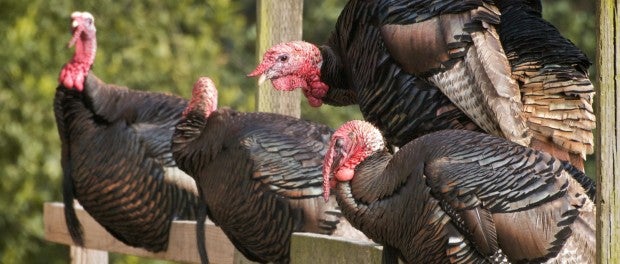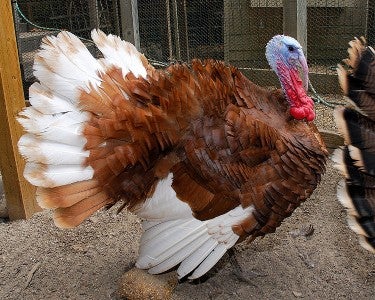Celebrate Thanksgiving Year ‘Round with Turkeys on the Farm

In the past we’ve delved into a world of chickens and ducks on the farm. For beginning farmers, chickens are an easy bird to master with ducks following closely behind. What if instead of these two birds it is turkeys you prefer? Raising turkeys on the farm can be done in much the same manner as other poultry animals with a few care and maintenance modifications, giving you birds that dress out between 12 to 28 pounds depending on the breed you choose.
Speaking of breed, the first step in raising turkeys is to decide which breed is ideal for your farm and family. Once your research is done and breed preference is determined, turkeys can be ordered via postal mail from hatcheries. This gives you access to a wide range of birds that you may not be able to find locally, although local acquisition is possible. Checking the bulletin board at your local feed store is a good place to find turkey chicks, or poults, for sale or post that you are looking for some. Should that not pan out, however, you can always fall back on the post office to deliver them right to your door.
Some of the more popular turkeys for farm raising include:
1. Bourbon Red turkeys are a heritage breed that are red, black, and white in color and medium-sized. They forage heartily and are named for Bourbon County, Kentucky from where they originated.
2. Midget White turkeys are small in size and quick to grow. Traditionally found in grocery stores, they are favored for intimate family gatherings.
3. The Narragansett turkey is black, gray, tan, and white in color and hails from Narragansett Bay in Rhode Island. Though in the past this bird was much heavier, it is presently seen in a weight range of 14 to 23 pounds.
4. Standard Bronze turkeys are likely the most popular breed of turkey today. They are a larger bird that dresses out at up to 28 pounds, therefore making it a good selection for large families and holiday gatherings.
5: Eastern Wild turkeys, though small, are favored for their robust and rugged nature. The problem with this breed, however is that they are actually illegal in some states so it is necessary to check local laws before adding this bird to your farm.
Once your chicks arrive, it is important to keep them in an area where they will be warm and dry. Turkey chicks need to be fed an un-medicated chick food that is safe for turkeys (check the bag for details) and provided easy access to fresh water. In many cases, turkeys will need to be shown where to gain access to food and water at a young age, so be vigilant about their condition to ensure they are getting the food and water that they need. As they grow, you can add other foods to their diet such as corn and oats but continue to assure all foods your turkeys eat are un-medicated. Given the chance, turkeys will free range just as chickens do, foraging about on your farm.
It will become possible for turkey chicks to fly so it may be necessary to clip their wings in order to keep them on your farm. Wing clipping will need to be repeated every month or so in order to keep birds grounded. This has a downside in that it makes them vulnerable to predation when young, but as they grow in size they become less likely to be preyed upon. Until they are of a decent size, they can be kept in a coop at night, and eventually moved to a pen with other livestock to help keep them safe.
Upon reaching 20 weeks of age, most turkeys are ready for the table. At this age, their meat will be at its most appetizing point of tenderness while still giving you a large enough bird to make processing worthwhile. It is possible, however, to allow them to continue to grow beyond this point, but do keep in mind that there will come a time when they may become aggressive as in the case of nesting hen or sexually mature toms. The decision on when to process birds is up to the individual.
If having large poultry birds in your farm freezer appeals to you, raising turkeys could be the ideal way to achieve that. Not only are they beautiful to look at and tasty on the plate, but they provide valuable pest control services in much the same manner a chicken would. If you want turkey on your table at more than just Thanksgiving, adding such birds to your farm is the way to go.






 Your Privacy Choices
Your Privacy Choices
Leave a comment